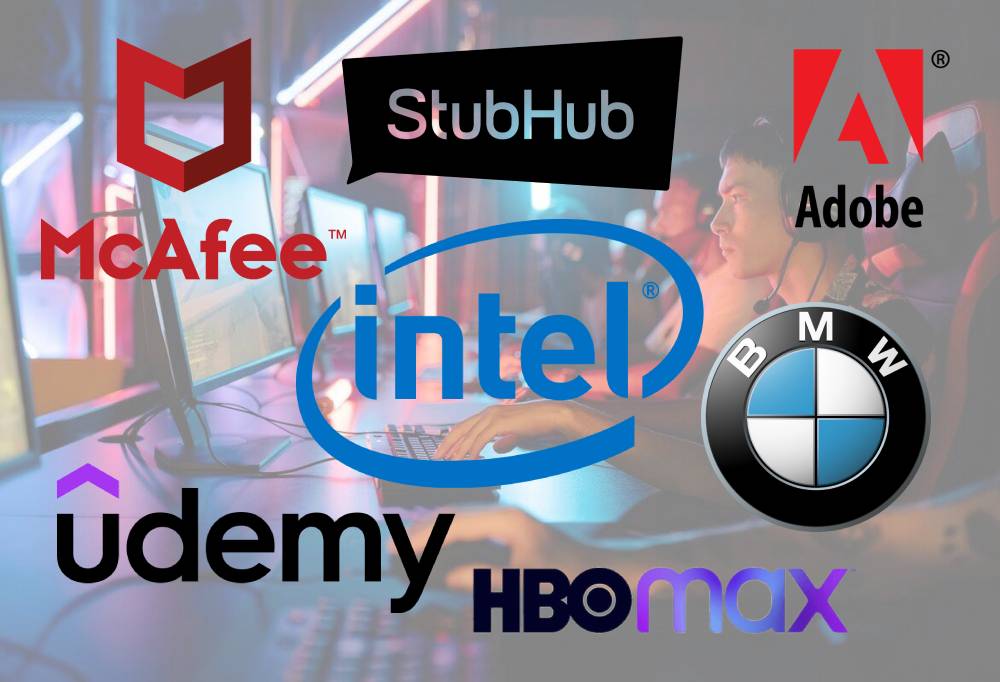
The esports industry has grown into a multi-billion-dollar market, drawing millions of fans and players worldwide. As competitive gaming gains mainstream appeal, brands are seizing opportunities to partner with tournaments, teams, and events. Companies like Adobe and McAfee leverage esports to connect with younger, tech-savvy audiences, boosting brand visibility and industry growth.
Why Brands Are Investing in Esports
Esports offers a unique way to engage a highly involved audience. Events like the League of Legends World Championship and The International (Dota 2) attract millions of viewers, rivaling traditional sports. Brands see the potential to reach millennials and Gen Z, who are less receptive to conventional ads.

Adobe partners with esports organizations to provide creative tools for content creators, fostering brand loyalty. McAfee sponsors major esports events, highlighting the need for cybersecurity in gaming. These partnerships help brands showcase products while addressing industry challenges.
Additionally, major brands like Red Bull, Intel, and BMW are investing heavily in esports through team sponsorships, event organization, and even infrastructure development. Red Bull, for instance, sponsors top-tier esports athletes and hosts gaming tournaments, reinforcing its image as a performance-driven brand. BMW has launched the "United in Rivalry" initiative, bringing together top esports teams under its sponsorship. Meanwhile, Intel’s presence in esports extends to hardware sponsorships, ensuring high-performance gaming equipment for players and streamers.
How Brands Are Integrating into Esports
Brands go beyond sponsorships, becoming integral parts of the esports experience. From exclusive merchandise to interactive fan engagement, companies are innovating their approach:
- Adobe: Provides creative software for high-quality streaming and content creation.
- McAfee: Offers cybersecurity solutions to protect gamers from online threats.
- Red Bull: Sponsors esports athletes and hosts competitions to engage gaming audiences.
- Intel: Supplies top-tier gaming hardware to esports organizations and events.
- BMW: Runs the "United in Rivalry" campaign, uniting global esports teams.
- Ticket Platforms (e.g., StubHub, See Tickets): Facilitate ticket sales for live esports events.
- Streaming Services (e.g., HBO Max, Discovery Plus): Broadcast esports tournaments to wider audiences.
- Learning Platforms (e.g., Udemy, Brilliant.org): Offer courses on game development and strategy.

These collaborations help brands adapt to esports' unique demands, fostering industry innovation and growth. The integration of brands into esports also extends to in-game advertising, where companies like Louis Vuitton have partnered with game publishers to create exclusive virtual skins and collectibles, merging luxury fashion with gaming.
The Future of Brands in Esports
The rise of esports has created new opportunities for brands to engage a global audience. By partnering with tournaments and teams, companies like Adobe and McAfee enhance visibility while contributing to the industry's professionalization. As esports continues expanding, more brands will enter the space, shaping the future of competitive gaming.
With the rapid growth of mobile esports and the increasing adoption of virtual reality (VR) gaming, brands are exploring even more innovative ways to connect with audiences. Companies like Oculus and Samsung are investing in VR technology to enhance the esports experience, pushing the boundaries of how competitive gaming is played and watched. Moreover, the integration of artificial intelligence (AI) in gaming analytics allows brands to offer personalized gaming experiences, further revolutionizing the esports landscape.